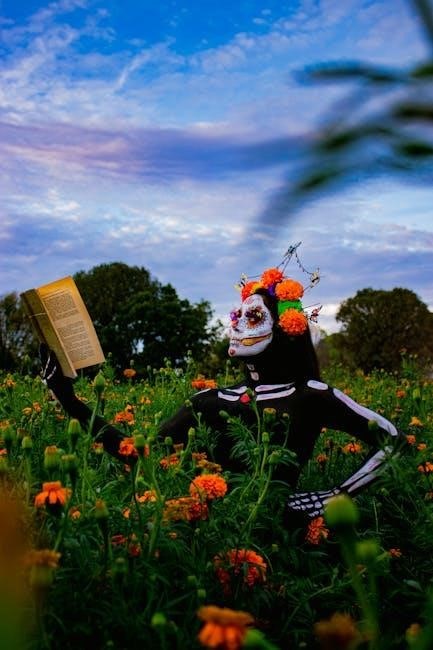
Dead Poets Society, a timeless story of self-discovery and rebellion, explores themes of conformity, individuality, and the power of poetry. The novel, adapted from the iconic film, resonates deeply with readers seeking inspiration and freedom of expression.
Overview of the Book and Its Significance
Dead Poets Society, written by Nancy H. Kleinbaum, is a captivating novel based on the 1989 film of the same name. It explores themes of conformity, individuality, and the transformative power of poetry. The story follows a group of students at Welton Academy who, inspired by their unconventional teacher, Professor Keating, revive the Dead Poets Society, a secret club where they embrace self-expression and challenge societal norms. The book has become a beloved classic, resonating with readers of all ages and emphasizing the importance of embracing one’s true self.
Relevance of the PDF Version in Modern Times
The PDF version of Dead Poets Society remains highly relevant today, offering a convenient and accessible format for readers. With the rise of digital reading, the PDF ensures that the timeless story of self-discovery and rebellion reaches a new generation. Its themes of individuality and the power of poetry continue to resonate, making it a valuable resource for both academic and personal exploration in an increasingly digital world.
Author Background: Nancy H. Kleinbaum
Nancy H. Kleinbaum (August 30, 1948–October 24, 2024) was an American writer and journalist, best known for novelizing the film Dead Poets Society into a beloved book.
Biography and Literary Contributions
Nancy H. Kleinbaum (1948–2024) was a renowned American writer and journalist, celebrated for her impactful storytelling and poetic prose. Her literary contributions include the novelization of Dead Poets Society, which captures the essence of the iconic film. Kleinbaum’s work often explored themes of individuality, self-expression, and the transformative power of art. Her background in journalism enriched her writing, lending depth and authenticity to her narratives. Through her writing, she inspired readers to embrace their uniqueness and pursue their passions, leaving a lasting legacy in modern literature.
Why She Chose to Novelize the Film
Nancy H. Kleinbaum chose to novelize Dead Poets Society to expand the emotional and philosophical depth of the story. By transforming the screenplay into a novel, she aimed to delve deeper into the characters’ inner worlds and amplify the themes of conformity and self-expression. The novel format allowed her to explore the complexities of Professor Keating’s influence and the students’ journeys, creating a richer, more immersive experience for readers. This adaptation ensured the story’s timeless message reached a broader audience beyond the film.

Plot Summary of “Dead Poets Society”
Dead Poets Society follows the story of students at Welton Academy, inspired by Professor Keating to revive a secret poetry club. Through their journey, they confront conformity and tradition, embracing individuality and self-expression in a rigid environment, leading to profound personal growth and tragic consequences that highlight the struggle between freedom and societal expectations.
Setting: Welton Academy and Its Significance
Welton Academy, an elite, traditional all-boys boarding school, serves as the primary setting for Dead Poets Society. Its strict, conservative environment emphasizes conformity and academic rigor, stifling individuality. The academy’s rigid rules and expectations create a backdrop for the story’s exploration of rebellion and self-discovery. The setting’s historical context, rooted in 1950s America, highlights societal pressures and the struggle for personal freedom. Welton’s significance lies in its role as both a physical and symbolic barrier to the characters’ growth, making it central to the narrative’s tension and themes.
The Resurrection of the Dead Poets Society
The Dead Poets Society, once a dormant group, is revived by Professor Keating’s charismatic influence. The boys, inspired by his passion for poetry and individuality, secretly reform the club in a hidden cave. This resurrection symbolizes their rebellion against Welton Academy’s rigid traditions and societal expectations. Through midnight gatherings and poetic expressions, the society becomes a sanctuary for self-discovery and freedom. The revival sparks a transformative journey, challenging the students to embrace their true selves amidst the pressures of conformity and authority.
Key Plot Points and Character Development
The story unfolds with Todd Anderson’s shy demeanor gradually transforming into confidence, while Charlie Dalton’s rebellious nature leads to pivotal confrontations. Neil Perry’s tragic struggle to balance his passion for acting with his father’s expectations culminates in a heart-wrenching climax. These key plot points highlight the characters’ growth, showcasing their battles with identity, family pressures, and societal norms. Each character’s journey underscores the central theme of embracing individuality amidst oppressive expectations, leaving a lasting emotional impact on readers.

Themes Explored in the Book
The novel delves into conformity vs. individuality, the transformative power of poetry, and the struggle between youthful dreams and harsh realities, resonating universally with its profound messages.
Conformity vs. Individuality
The struggle between conforming to societal expectations and embracing individuality is a central theme. The characters, particularly Todd and his peers, grapple with pressures from family and school to fit in, while Professor Keating encourages them to find their unique voices. This tension highlights the challenges of maintaining personal identity in a rigid, tradition-bound environment, ultimately inspiring the boys to break free and assert their true selves, leading to profound self-discovery and growth.
The Power of Poetry and Self-Expression
Poetry becomes a catalyst for self-expression, empowering the boys to voice their innermost thoughts and emotions. Professor Keating’s unorthodox methods inspire them to embrace their individuality and find strength in words. Through their experiences, the novel highlights how poetry transcends mere art, serving as a powerful tool for personal liberation and emotional connection. This theme resonates deeply, showing how self-expression can transform lives and foster authenticity in a world often governed by conformity and silence.
The Struggle Between Dreams and Reality
The novel vividly portrays the tension between youthful aspirations and the harsh demands of the real world. The boys, inspired by Keating, chase their ideals, only to face the rigid expectations of their families and society. This struggle is poignantly reflected in Todd’s journey, as he grapples with his identity and the pressures of conformity. The book underscores the universal challenge of balancing ambition with responsibility, leaving readers contemplating the sacrifices required to pursue one’s true passions in a world that often prioritizes practicality over creativity and individuality.

Character Analysis
Dead Poets Society delves into the transformation of its characters, particularly Professor Keating, Todd Anderson, and the Dead Poets Society members, highlighting their growth and self-discovery journeys.
Professor John Keating: The Unconventional Teacher

Professor John Keating, portrayed as an inspiring and unconventional educator, challenges traditional norms at Welton Academy. His unorthodox methods, such as standing on desks and encouraging students to “seize the day,” foster a deeper appreciation for poetry and life. Keating’s passion and belief in individuality inspire his students to break free from societal expectations, making him a pivotal figure in their journey of self-discovery and growth.
Todd Anderson: The Journey of Self-Discovery
Todd Anderson, a shy and introspective student, struggles to find his voice amidst his father’s imposing expectations. Inspired by Professor Keating and the Dead Poets Society, Todd gradually gains confidence, embracing his creativity and individuality. His journey is marked by moments of vulnerability and courage, as he learns to express himself authentically, ultimately finding the strength to stand up for his passions and beliefs in a world that often discourages them.
The Dead Poets Society Members: Their Roles and Growth
The Dead Poets Society, revived by Keating’s inspiration, becomes a sanctuary for its members to express their true selves. Each student brings unique perspectives and struggles, but through their shared experiences, they grow emotionally and intellectually. The club fosters camaraderie and personal transformation, as they challenge societal norms and embrace their individuality. Their journey highlights the power of unity and the impact of supportive relationships in overcoming adversity and discovering one’s true potential.

Adaptations and Legacy
Dead Poets Society transitioned from a beloved film to a novel and stage play, ensuring its timeless themes of self-expression and rebellion continue to resonate across generations.
From Film to Novel: The Story Behind the Adaptation
Nancy H. Kleinbaum adapted the screenplay into a novel, enriching the story with deeper character insights and emotional depth. The adaptation stays true to the film’s essence while offering a fresh perspective. This transformation allowed readers to connect with the characters on a more personal level, exploring their inner struggles and growth. The novel captures the spirit of the movie, making it a cherished companion for fans of the original story.
Stage Play Adaptations and Their Reception
Dead Poets Society has also been adapted into a stage play, written by Tom Schulman, the original screenwriter. The play captures the essence of the story, focusing on themes of individuality and mentorship. It has been well-received, with audiences praising its emotional depth and faithful adaptation. The stage version brings the iconic characters to life, resonating with fans of the film and book. Its success highlights the timeless appeal of the story across different mediums.

Availability and Access
The Dead Poets Society book is widely available in PDF and e-book formats, making it accessible to readers globally. Online platforms offer convenient downloads, ensuring its timeless themes reach new generations.
Where to Find the PDF Version of the Book
The PDF version of Dead Poets Society by Nancy H. Kleinbaum is easily accessible online through various platforms. Readers can download it from popular e-book retailers like Amazon, Google Books, or Barnes & Noble. Additionally, educational websites and digital libraries often provide free or paid access to the novel. Availability may vary depending on regional copyright restrictions, so checking multiple sources is recommended to ensure uninterrupted access to this inspiring story.
Importance of Preserving Literary Works Digitally
Preserving literary works like Dead Poets Society in digital formats ensures their accessibility for future generations; PDF versions safeguard the text from physical degradation and make it easily shareable globally. Digital archiving reduces storage costs and protects rare copies, while also enabling wider educational and scholarly access. This modern approach fosters a deeper appreciation of timeless stories, ensuring that their messages of individuality and self-expression endure in an ever-evolving world.
Dead Poets Society remains a timeless story of self-discovery and rebellion. Its themes of individuality and poetry’s power continue to inspire, while its PDF format ensures accessibility for readers worldwide.
Final Thoughts on the Book’s Impact
Dead Poets Society leaves a lasting impression, emphasizing the importance of embracing individuality and creativity. Its relatable characters and profound themes make it a cherished read. The PDF version ensures accessibility, allowing new generations to discover its timeless message. Readers are encouraged to explore this inspiring story, which continues to resonate deeply, fostering personal growth and a love for poetry. Its impact endures, making it a must-read for anyone seeking motivation and self-expression.
Encouraging Readers to Explore the PDF Version
Exploring the PDF version of Dead Poets Society offers a convenient and accessible way to experience this inspiring story. The digital format ensures that the book reaches a wider audience, allowing readers to delve into its profound themes and memorable characters anywhere, anytime. By embracing the PDF, readers can easily highlight, annotate, and revisit their favorite passages, making the experience even more personal. This modern format breathes new life into a timeless tale, ensuring its legacy endures for future generations to enjoy.